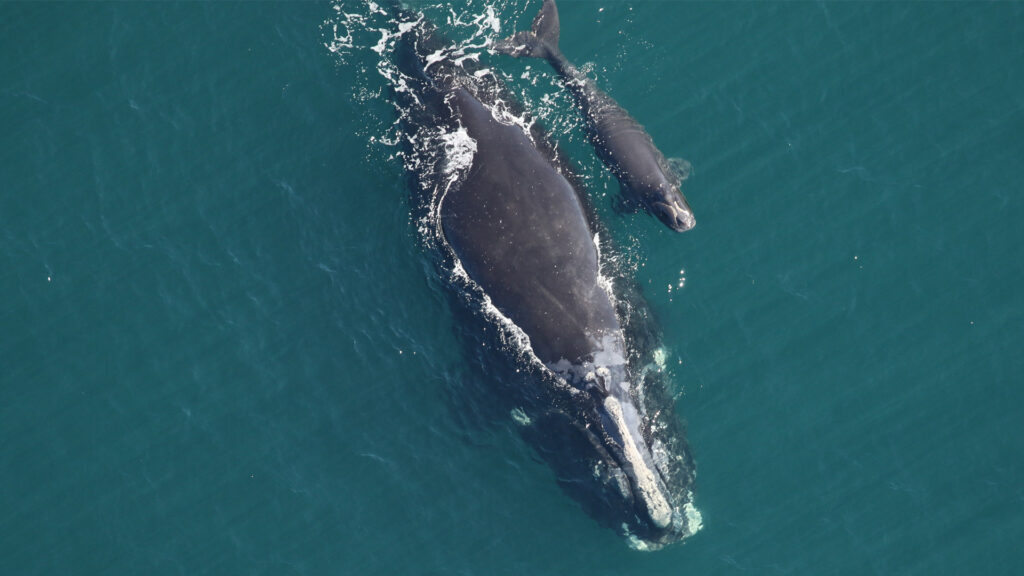By Ericca Gandolfo, Animal Welfare Institute
In late November, scientists heralded the sighting of a rare North Atlantic right whale named Juno and her calf off Georgetown, South Carolina — the first such mother-calf pair observed during the calving season.
Less than three months later, Juno’s calf is expected to succumb to a slow, painful death, after sustaining severe head and mouth injuries — most likely from a boat propeller. Vessel strikes have caused at least 36 deaths and 85 serious injuries since 2017, according to National Oceanic Atmospheric Administration (NOAA) data. (Since only about a third of right whale deaths are documented, the numbers are likely far higher.) No more than 360 right whales remain on Earth, including fewer than 70 reproductively active females. At the current rate of decline, the right whale is heading toward extinction.
Research has indicated that right whales were once vital to maintaining and regulating healthy ocean ecosystems. If right whale numbers are allowed to recover, they could play an essential role in improving ocean productivity and addressing the global climate crisis. Nevertheless, entanglements in commercial fishing gear and vessel strikes continue to represent the two leading threats to the species.

Federal action to mitigate fishing gear entanglements has been delayed until 2029, thanks to a last-minute insertion in last year’s omnibus spending package at the behest of Maine lawmakers and the lobster industry. As a result, it is more urgent than ever to slow down vessels in right whale habitat, which would lower their mortality risk by 80% to 90%.
NOAA’s existing vessel speed rule, issued in 2008, requires vessels at least 65 feet long to travel at no more than 10 knots (about 12 mph) at specific times of the year and in specific zones along the East Coast that are home to North Atlantic right whales, especially mother-and-calf pairs. Despite misleading claims by certain members of Congress and industry lobbyists representing the recreational boating and fishing community, the rule includes exemptions to protect mariner safety in inclement weather and excludes military and law enforcement vessels.
Since this rule was adopted 16 years ago, climate change and human activities (e.g., seismic blasts for underwater oil and gas surveys, shipping traffic, and certain military sonar exercises) have caused shifts in right whale migration patterns, essentially forcing them to swim through unprotected waters. Moreover, right whale deaths continue to outweigh calf births, and there is growing evidence that collisions with vessels shorter than 65 feet also lead to fatalities.
As this population is protected by the Endangered Species Act and the Marine Mammal Protection Act, the federal government is legally obligated to take action to recover the species and prevent its extinction.
Yet, one practical solution has become mired in delay tactics. Three years ago, NOAA recommended improvements to the 2008 rule, such as applying the 10-knot maximum speed to smaller vessels at least 35 feet long and expanding seasonal speed zone boundaries and timing. The agency held numerous public meetings to answer questions and emphasize the science behind the proposed rule. In October 2022, the public comment period closed with more than 90,000 comments.

Still, some vocal opponents, including industry stakeholders and politicians, have erroneously claimed that NOAA failed to properly engage the public. For months, they have attempted to sabotage the federal rulemaking process by circulating misinformation targeting recreational boaters and fishers, and proposing legislative measures that seek to delay or stop NOAA from finalizing the amended rule. In reality, 95% of recreational vessels are less than 35 feet long, and millions of boaters won’t be affected by the proposed speed limits.
Among the most dangerous efforts to dismantle future right whale protections is the disingenuously named Protecting Whales, Human Safety and the Economy Act, introduced last year by U.S. Sen. Joe Manchin (D-WV) and U.S. Rep. Buddy Carter (R-GA). The bill’s language, which has been inserted into various federal appropriations proposals, would prevent NOAA from changing its vessel speed rule until alternative underwater technologies are available to monitor right whale movements. In fact, these technologies are still very much in development and will never fully replace vessel speed regulations.
Shortly before the current calving season, NOAA announced in November further delays to these long-awaited right whale protections without explanation.
As another calf’s life hangs in the balance, the public must demand that the agency issue its final vessel speed rule now.
Ericca Gandolfo is a marine policy advisor at the Animal Welfare Institute. This opinion piece was originally published by Florida Today, which is a media partner of The Invading Sea.
If you are interested in submitting an opinion piece to The Invading Sea, email Editor Nathan Crabbe at nc*****@*au.edu. Sign up for The Invading Sea newsletter by visiting here.



